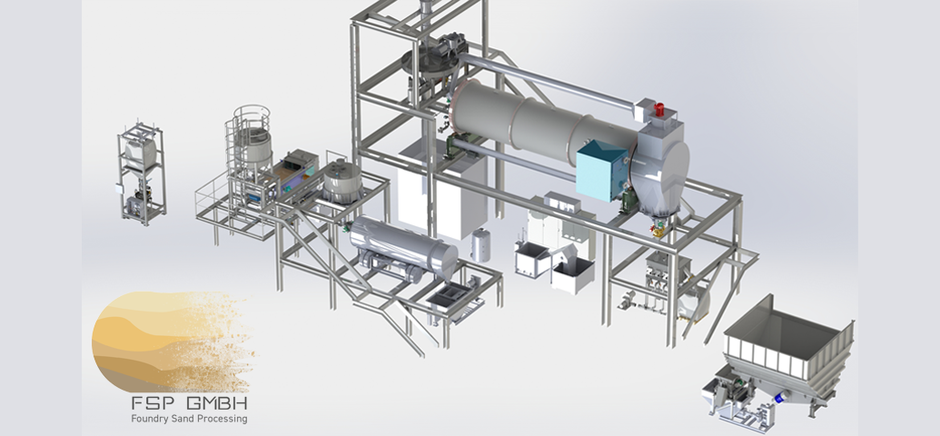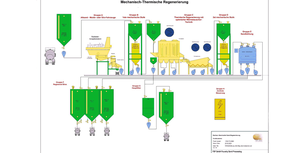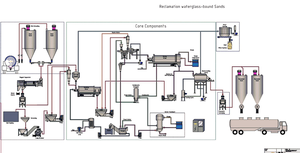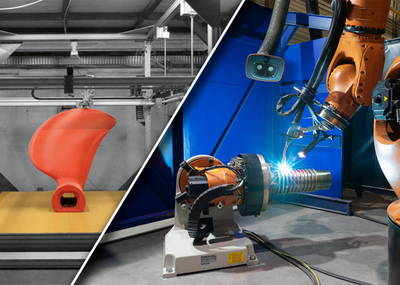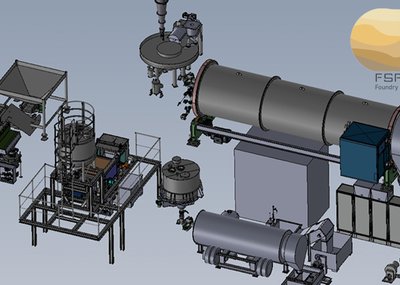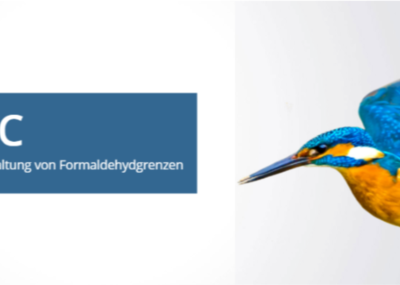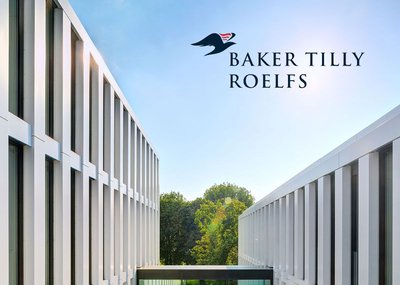The operator model in practice
FSP is pursuing a concrete roadmap: The pilot plant for wet reclamation, which has been in operation since 2022, will be expanded to a throughput of 2.5 tonnes per hour, i.e., around 20,000 tonnes per year. A further pilot plant for mechanical-thermal regeneration with a capacity of around one tonne per hour is under construction and will be available to customers for test series and open-loop processes from May 2024.
FSP will also install a mechanical-thermal system with a throughput of six tonnes per hour, i.e., around 70,000 to 75,000 tonnes per year, at its headquarters in Stuttgart in the course of this year. It will be ready for series production at the beginning of 2025 and will primarily supply foundries in the greater Stuttgart area and the rest of Baden-Württemberg.
FSP is also planning to open two to three further sites in the near future, each of which will serve other foundries within a radius of 200 to 300 kilometres. They will each have a capacity of around 180,000 to 200,000 tonnes of used sand per year.
Both test facilities will be available to foundries from May 2024. They can be used to test and analyse the regenerability of inorganically or organically bound sands, or even mixed sands. FSP offers interested customers a range of different tests - from a simple test series with up to 1 tonne of sand to a complete free-running process with determination of the best possible ratio of reclaimed and new sand in core production. At the end of the tests, the customers receive the reclaim, dust and waste backpacked in big bags. This allows them to draw conclusions about the composition of the reclaim, for example the ratio of reclaim to fines and residual materials.
The main quality characteristics relevant to both binder systems (inorganic and organic) are determined in the in-house sand laboratory: Fines content and AFS number, active clay and slurry content, pH value, residual alkalinity, electrical conductivity, loss on ignition, strengths, and core weight.
For the test series and in subsequent series operation, sand samples are analysed on delivery of the used sand and on delivery of the reclaimed sand. The quality is recorded and documented online during series operation of the reclamation plants. This prevents deviations from the agreed quality criteria of the reclaimed sand. External laboratory facilities can also be consulted.
INFO: The technology in detail
The following applies to both reclamation variants: the used sand can be delivered in both silo and skip lorries. The complex plant and process technology ensures that the used sand - before it is fed into the actual reclamation process - is free of foreign materials, scrap metals and lumps and is dry and free-flowing. After reclamation, the reclaimed material is conveyed into outdoor silos and is ready for transport in silo lorries for collection.
In order to minimise the customer's handling costs, any necessary adjustments at the customer's plant to ensure a smooth and consistent supply of reclaim are clarified together on a case-by-case basis and implemented on site.
FSP's globally patented process for the wet regeneration of inorganically bonded core sands washes 98 per cent of adhering residues from the used sand. All common water glass-bonded used sands as well as special sands from 3D printing can be fully processed.
In the patented drying system, the sand is not dried with air, but the moisture is extracted from it in an energy-efficient manner through condensation. The sand is then cooled in a separator with patented fluidisation and additionally dedusted.
In principle, washing is the gentlest option for regenerating inorganic binders, as there is no direct mechanical impact on the sand grain. As a result, no additional dust is formed apart from the fines that are already contained in the used sand and are washed out. The process water required for the washing process is 100% treated and kept in a closed circuit. Binder components and waste from the casting process are completely washed out and removed from the process as sludge via the water treatment system. The resulting waste is disposed of in a certified process and the correct treatment is documented.
With mechanical-thermal regeneration, FSP is also setting new standards in the field of regeneration using series systems with medium and high throughput rates. The process can be used for both bentonite-bound green sand and organically bound core sand (cold box, hot box, shell sand, furan). Compared to conventional mechanical or purely thermal regeneration processes, the process technology reduces the dust content to a minimum.
Thermal-mechanical regeneration is characterised by the high efficiency of the three-stage system. After pre-treatment of the used sand, the sand is fed dry and free-flowing to the first - mechanical - stage, in which sand grain by sand grain and thus the binder is removed.
In the second stage, the sand is fed to the thermal stage. Gas and air mix in a sand bed, it fluidises, and the organic binder and fines are burnt. The effect of the quartz cracking loosens any remaining binder from the natural recesses of a grain of sand or even blasts it off. In the third, also mechanical stage, the last residues are rubbed off the grain; it works in the same way as stage one.
Providing information on site
In June 2024, FSP will be organising an "open week" at the Stuttgart site: Interested parties can visit all the plants and see for themselves both the efficiency of the two regeneration processes and find out about the advantages of the operator model.
About the FSP Gmbh
Founded in Stuttgart in May 2022, FSP GmbH Foundry Sand Processing develops and sells systems and solutions for the regeneration and processing of bulk materials. The basis is decades of experience in the recycling of raw materials and the mechanical-thermal or wet regeneration of used foundry sands. The founding partners are Heinrich Feess GmbH & Co. KG in Kirchheim/Teck and DEANTEC GmbH in Kirchhundem.
Feess, which was awarded the German Federal Environmental Prize in 2016, proved its expertise in the recycling of mineral waste, while DEANTEC contributes its experience with its unique, patented wet regeneration and drying process - a plant technology that uses exclusively renewable energy in the processing of used sand.
The merger to form FSP GmbH offers customers the complete, almost CO2-neutral sand processing chain. The regenerated material replaces up to 95 per cent of new sand and makes an important contribution to the conservation of resources and sustainable production.
Author: Dipl.-Oec. Stefan Zimmermann, Managing Director, FSP GmbH Foundry Sand Processing, Stuttgart

